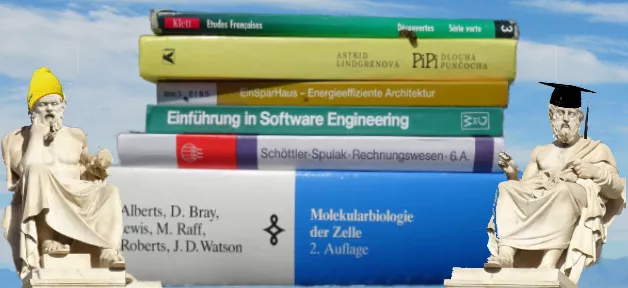Transition to Circular Economy: the role of education from youth to higher education
Reading time approximately 4 minutes - Read, like, comment!
Original language: EN
Schools and universities must teach theoretical knowledge about the circular economy and also support outside the classrooms and lecture halls the cultivation of a sustainability mentality and eco-responsible citizenship.

Socrates and Platon from School to University by Dr. Volker Ludwig (CC-BY 4.0)
.
Circular Economy: An alternative model of growth for a sustainable future
The established economic practices, prevailing production, consumption and development in a global range, are dominated by the linear process inherited by the post-war industrial growth model, which is based on a “produce-use-dispose” model. In fact, it is the short-sighted notion of growth, that puts at risk the near-future resource sufficiency, as well as it incurs heavy costs on the environment, through copious waste production and greenhouse gas emissions. However, environmental degradation, directly linked with a degradation in human well-being, is not an inevitable path, as long as modern economies and societies are willing to adopt sustainable and perceptive strategies with respect to finite resources, and of course to the climate change.
To that end, it is essential to move towards an alternative model that can decrease the risk of resource scarcity, responding the unprecedented climate challenges, as promised by the Circular Economy (CE) model. Though, the transition to a CE can only be conceived in terms of a systemic change, requiring changes in the economic, political and socio-cultural realms.
“Bottom-up” change through Education
Our work and research, in the context of our project, has shown that organizations and businesses are increasingly recognizing the opportunities the CE approach provides, and making progress in initiating sustainable practices. However, industry and technological innovation alone cannot drive the systemic changes needed to achieve a true transformation of the current economic model. Viable changes presuppose a paradigm shift from individual behaviors to collective/cultural adoption of CE principles. Thus, it is the substantial part of education, from early ages to higher education, to instill new visions for our society and economy with respect to sustainability and eco-friendly growth.
Bellow, a spectrum of useful recommendations unfolds, considering both schooling and higher education strategies to equip young people to become themselves agents of the transition to CE. To achieve that, the following do not abide just to the conceptual knowledge of CE, but focus on the cultivation of sustainability-mentality and eco-responsible citizenship.
Approaches to effectively instill circular economy principles from an early age
Initially, since early childhood consists of the most formative years of each individual, it is highly important to invest in the respective education level regarding the notion of sustainability, and the realization of the dependence of human life to the environment. Not limited to “lecture-based” environmental education, children could be involved in thoughtful discussions about habits of consumption, and concrete environment-protection actions. For instance, children can be introduced to the 7Rs for sustainable development (reduce, reuse, recycle, respect, repair, reflect and refuse) and explore how these principles can apply to their daily experience, as well as to be called to find “circular” solutions about the use of familiar goods (food, toys, etc.).
Applying to all levels of schooling education, any effective reform of curricula regarding CE should be accompanied by the respective investment in teachers’ training. It is essential that policy makers support and train these professionals, so to understand the key role they play in building a circular and sustainable society, and to develop the necessary skills to perform effectively, using contemporary pedagogical methods. In that context, peer-to-peer educational programs and out of classroom learning can be included, multiplying the positive effect of the sustainability-oriented curricula that teachers will deliver their students.
However, the social orientation of education can only be effective if driven by some critical principles and teaching methods, the ones that facilitate a process of reflection as preparation of action for personal and social change. Particularly, these may include the encouragement of students to rethink social structures, the alteration of classroom dynamics (placing students as creators of learning), and also the connection of theoretical knowledge to action.
Approaches to consolidate Circular Economical Thinking through Higher Education
Considering higher education’s part, it could prove equally crucial, since it is the responsible actor for shaping the capacities and mentality of most of the professionals in key positions, hence it can make substantial contributions in boosting the required changes through teaching, applied research, collaboration with industry and student led initiatives.
Higher education institutions (HEIs) are in position to broaden CE learning with respect to “transition themes and methods” (policy levers, the role of ICT, etc.), as well as to involve more social scientists to the transition efforts by including CE courses to economics, political science, sociology, and pedagogy schools. Outside the lecture hall, institutions can actively promote the CE mentality through introducing CE-related extracurricular activities, clean-energy campus initiatives, and zero-waste operating canteens.
Furthermore, HEIs catalyst role in research can contribute to the requested transition through various ways that lead to innovation, as well as to more qualitative information both for the market and industry. In particular, HEIs can proceed to partnerships with local businesses and industry gaining mutual benefits and introducing CE frameworks directly in local and regional level. The provision of evidence of demand for CE skillsets along with the adaptation of curricula to that purpose could also ignite a virtuous cycle of sustainability working frameworks. Moreover, investment to research on methods of CE implementation and larger scale transitions shall multiply the aforementioned benefits, as well as the number of beneficiaries.
HEIs can also enhance sustainability by providing training grounds, where future professionals and citizens can become environmentally conscious, by providing real and innovative actions that aim to increase environmental awareness and commitment to engage in appropriate action (e.g. organization of a Green Day). Also the creation of a fund for students and researchers, available for launching their own CE principles-abiding projects could serve as an incubator for sustainable enterprises.
Conclusion
In light of the above, initiating CE mentality and accommodating ecologically-oriented curricula and educational strategies could prove to be the driving force to making our economies less wasteful and more resourceful. An innovative education approach could help us nurture future citizens with more eco-responsible mindsets and more sustainable habits. Although the benefits of CE-education will be widespread only when we take the steps to impart the right values and messages from early childhood on to adulthood and higher education, and from the educators and methods inside the classroom to the broader learning context and the whole community.
About the authors:

Eliana Vasileiou has studied Molecular Biology & Biotechnology, and gained her MSc degree from the Radboud University, Netherlands, in Cognitive Neuroscience. She has been working as an EU-project manager for the last 2 years, as part of the NGO EKO, in Greece, has accumulated experience as a youth worker and team manager, and is interested in environmental & social sustainability issues. She has accompanied the SCRCE project from the start.
.
.

.
Read more from the SCRCE project:
Sustainability through Cross Border Circular Economy (SCRCE)




